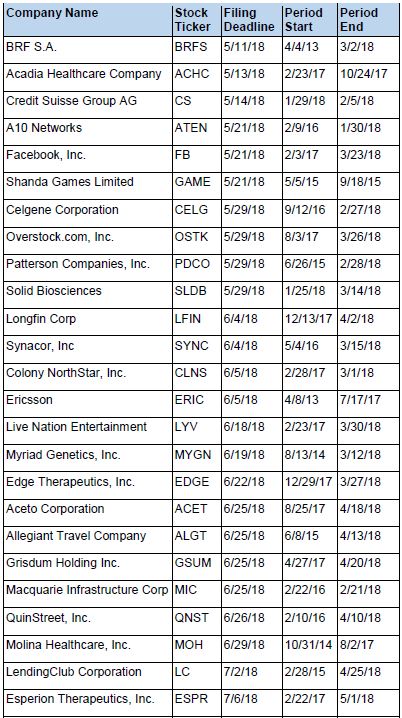GSUM Class Action Report
Levi & Korsinsky, LLP
May 8, 2018
On April 25, 2018, investors sued Gridsum Holding, Inc. (“Gridsum” or the “Company”) in United States District Court, Southern District of New York. Plaintiffs in the federal securities class action allege that they acquired Gridsum American Depository Receipts (ADRs) at artificially inflated prices between April 27, 2017, and April 20, 2018 (the “Class Period”). They are now seeking compensation for financial losses incurred upon public revelation of the Company’s alleged misconduct during that time. Here’s everything you need to know about the Gridsum class action lawsuit (GSUM class action lawsuit):
Summary of the Allegations
Company Background
The Company (NASDAQ: GSUM) bills itself as a “leading provider of cloud-based big-data analytics and AI solutions for multinational and domestic enterprises and government agencies in China.” As such, it delivers technology that allows its customers “to identify complex relationships within their data and gain new insights that help them make better business decisions.”
According to Gridsum’s website, the Company chose its moniker “to symbolize the combination of distributed computing (Grid) and analytics (sum).” As a self-described “digital intelligence pioneer”, Gridsum says its primary goal “is to help enterprises and government organizations in China use data in new and powerful ways to make better informed decisions and be more productive.”
Summary of Facts
The Company and two of its senior officers are now accused of deceiving investors by lying and withholding critical information about Gridsum’s business practices and policies during the Class Period.
Specifically, they are accused of omitting truthful information about the adequacy of Gridsum’s internal controls over financial reporting and the accuracy of its financial statements from SEC filings and related material. By deliberately or recklessly doing so, they allegedly caused the Company’s ADRs to trade at artificially inflated prices during the time in question.
The truth emerged in a press release issued by the Company on April 23, 2018. In it, Gridsum revealed that its “audit report for the Company’s financial statements for the year ended December 31, 2016, should no longer be relied upon.” The Company also said that its auditor “identified certain issues…” related to “certain revenue recognition, cash flow, cost, expense items and their underlying documentation which [the auditor] had previously raised” with Gridsum.
A closer look…
As alleged in the April 25 complaint, the Company repeatedly made misleading public statements during the Class Period.
For instance, on a form filed with the SEC on April 27, 2017, Gridsum said in relevant part: “Our discussion and analysis of our financial condition and results of operations are based upon our consolidated financial statements, which have been prepared in accordance with U.S. GAAP, appearing elsewhere in this annual report.”
A press release issued by the Company on August 25, 2017 also stated in pertinent part: “We delivered strong financial and operating results once again in the second quarter of 2017.”
Finally, another press release issued by Gridsum on November 29, 2017, stated: “We delivered another strong quarter of growth driven by our continued effectiveness at attracting new clients…”
Impact of the Alleged Fraud on Gridsum’s Stock Price and Market Capitalization
| Closing stock price prior to disclosures:
|
$7.29 |
| Closing stock price the trading day after disclosures:
|
$6.12 |
| One day stock price decrease (percentage) as a result of disclosures:
|
16.04% |
The following chart illustrates the stock price during the class period:
Actions You May Take
If you have purchased shares during the Class Period, you may join the class action as a lead plaintiff, remain a passive class member, or opt out of this litigation and pursue individual claims that may not be available to the class as a whole.
NOTE: The deadline to file for lead plaintiff in this class action is June 25, 2018. You must file an application to be appointed lead plaintiff prior to this deadline in order to be considered by the Court. Typically, the plaintiff or plaintiffs with the largest losses are appointed lead plaintiff.
In order to identify your potential exposure to the alleged fraud during the time in question, you may wish to perform an analysis of your transactions in Gridsum common stock using court approved loss calculation methods.
Recently Filed Cases
Listed below are recently filed securities class action cases being monitored by us, along with the class period and the deadline to file a motion to be appointed as the Lead Plaintiff in the action. Please contact us if you would like an LK report for any of these cases:
About Us
| This information is provided for general information purposes only, and should not be construed as legal advice, nor does it establish an attorney-client relationship with Levi & Korsinsky LLP. Any and all information herein is simply an opinion based on publicly available information and should not necessarily be construed as fact. For more information, please visit our website at www.zlk.com.
Attorney Advertising
|
Levi & Korsinsky is a leading securities litigation firm with a hard-earned reputation for protecting investors’ rights and recovering losses arising from fraud, mismanagement and corporate abuse. With thirty attorneys and offices in New York, Connecticut, California and Washington D.C., the firm is able to litigate cases in various jurisdictions in the U.S., England, and in other international jurisdictions.
Levi & Korsinsky provides portfolio monitoring services for high-net worth investors and institutional clients. Our firm also assists investors in evaluating whether to opt-out of large securities class actions to pursue individual claims.
For additional information about this case or our institutional services, please contact us.
